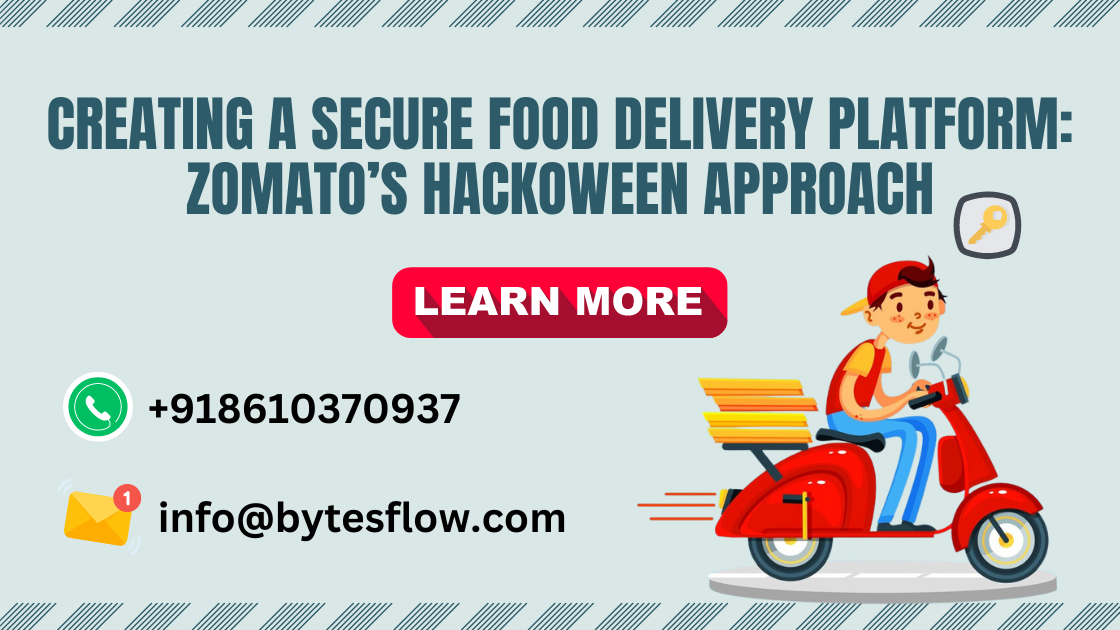In the digital age, securing your food delivery app is crucial as it handles sensitive customer information and financial transactions. Ensuring the protection of customer data related to orders and payments is essential due to increasing cybersecurity challenges. Zomato, a leader in the food delivery industry, has set a benchmark with its proactive approach to cybersecurity through initiatives like Hackoween. If you’re involved in the food delivery business or planning to enter the market, enhancing your app with robust security measures, inspired by Zomato’s practices, will help build trust and ensure continued usage. In this blog, let’s explore some of the key lessons from Zomato’s Hackoween event, providing insights on building a secure Zomato clone.
Hackoween Insights: Strengthening Security for Your Zomato Clone

1. Embrace Interactive Learning
Zomato’s recent Hackoween event utilized Capture The Flag (CTF) challenges to making learning about cybersecurity engaging and interactive. By incorporating gamified training sessions, your Zomato clone also can effectively educate the development teams on identifying and mitigating security vulnerabilities.
2. Cover Diverse Security Challenges
The Hackoween event featured 16 different challenges, including race conditions, SQL injection, and parameter tampering. Addressing a wide range of security issues ensures comprehensive protection. Implement your Zomato clone with regular training and simulation exercises covering various types of cyber threats to prepare your team for real-world scenarios.
3. Utilize Open Source Intelligence (OSINT)
Hackoween’s inclusion of OSINT challenges highlights the importance of leveraging publicly available information for security purposes. Encourage your team to use OSINT tools to gather intelligence on potential threats and vulnerabilities, helping to preemptively address security concerns of your Zomato clone app.
4. Adopt a Robust CTF Platform for Zomato Clone
Zomato used a Ruby on Rails platform inspired by CTFd for their Hackoween event. Investing in a robust and secure platform for cybersecurity training allows for a safe environment for your Zomato clone. So developers can hone their skills without compromising real systems.
5. Foster a Culture of Continuous Improvement
A significant takeaway from Hackoween is the importance of fostering a culture that prioritizes continuous improvement in security practices. Encourage your Zomato clone app development team to stay updated with the latest cybersecurity trends and to participate in ongoing training and development programs.
6. Regular Security Audits and Penetration Testing
Regularly perform security audits and penetration testing to uncover and resolve vulnerabilities. Zomato’s proactive strategy, highlighted by events like Hackoween, underscores the importance of continuous vigilance and enhancement of security measures.
7. Collaboration and Knowledge Sharing
Encourage collaboration and knowledge sharing within your team. Zomato’s event allowed participants to learn from each other’s approaches to solving security challenges. Create forums or regular meetings where team members can discuss recent threats and share solutions for the security of your Zomato clone.
Conclusion: Building a Secure Zomato Clone App
Building a secure food delivery platform like a Zomato clone requires a proactive and comprehensive approach to cybersecurity. By adopting lessons from Zomato’s Hackoween, such as embracing interactive learning, covering diverse security challenges, and fostering a culture of continuous improvement, you can significantly enhance the security of your food delivery script.
Investing in regular training, using robust platforms, and encouraging collaboration will help ensure your Zomato clone remains resilient against cyber threats.
Aparna Babukuttan is a content writer at Bytesflow Technologies who writes with passion and emotions. She has a keen interest in exploring the latest technologies and has years of experience in writing for artificial intelligence and Web3 including blockchain, NFT, metaverse, and cryptocurrency. Beyond Blockchain, Aparna also lends her expertise to crafting captivating narratives for on-demand food delivery businesses.

